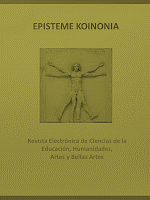El uso de gamificación en el aula de inglés para aumentar el vocabulario en principiantes (nivel a1)
DOI:
https://doi.org/10.35381/e.k.v5i9.1662Keywords:
Educational games, simulation games, team teaching. (Tesauro UNESCO).Abstract
El presente estudio de métodos mixtos examinó el efecto de la gamificación en la adquisición de vocabulario de estudiantes de Desarrollo de Software matriculados en un curso de inglés A1 en un Instituto de Educación Superior en Cuenca, Ecuador. Los participantes fueron divididos en un grupo experimentales y de control; los primeros recibieron instrucción mediante varias plataformas digitales, mientras que los últimos fueron expuestos a metodologías tradicionales. Luego de dos semanas, se observó un aumento estadísticamente significativo en el vocabulario del grupo experimental. Se concluyó que la gamificación tuvo un impacto más positivo en la adquisición de vocabulario y la motivación de los estudiantes que las metodologías tradicionales. Se concluyó que la gamificación es una herramienta efectiva y dinámica para la clase de inglés. Se incluyen recomendaciones y un plan de enseñanza.
Downloads
References
Al-Smadi, M. (2015). GAMEDUCATION:Using Gamification Techniques to Engage Learners in Online Learning. Immersive Education, 486, 85-97. doi:10.1007/978-3-319-22017-8_8
Andrade-Vargas, L., Estevao-Romeiro, A. I., Riofrio-Leiva, V., & Deisi, Y. G. (2021). Teacher's perceptions, institutional chanllenges, and educational sustainability during Covid 19 In Ecuador. Heliyon, 7(12), 10. doi:org/10.1016/j.heliyon.2021.e08596
Cano, M. C., & Ordoñez, E. J. (2021). Formación del Profesorado en Latinoamérica [Teacher Training in Latin America]. Teacher Training in Latinoamerica, 27(2), 284-295.
Chaves-Salas, A. L. (2001). Implicaciones Educativas de la Teoria Sociocultural de Vigotsky [Educational Implications of Vigotsky's Sociocultural Theory]. Revista Educacion, 25(2), 59-65. Retrieved from http://www.redalyc.org/articulo.oa?id=44025206
Chen, C. (2019). Using Anonymity in Online Interactive EFL Learning: International Students’ Perceptions and Practices. International Journal of Education and Development using ICT (IJEDICT), 15(1), 204-218.
Cuicui, C. (2020). The Application of Affective Filter Hypothesis Theory in English Grammar Teaching. Journal of Contemporary Educational Research, 4(6), 4. doi:10.26689/jcer.v4i6.1294
Debbita-Tan-Ai-Lin, D., Ganapathy, M., & Kaur, M. (2018). Kahoot! it: Gamification in Higher Education. Pertanika Journal of Social Sciences, 26(1), 1-18.
Doane, D. P. (2016). Applied Statistics in Business & Economics (5 ed.). New York: McGraw Hill.
Furdu, l., Tomozei, C., & Kose, U. (2017). Pros and Cons Gamification and gaming in classroom. Computers and Society, 8(2), 56-62. doi:arXiv:1708.09337v1
Gardner, E. B. (2008). Attitudinal and Academic Effects of Service-Learning. Journal of Preventionand Intervention in the Community, 18(1-2), 97-109. doi:10.26689/jcer.v4i6.1294
Gardner, R., Lalonde, R. N., & Moorcroft, R. (1985). The role of attitudes and motivation in Second Language Learning: Correlational and experimental considerations. 35(2), 207-227. doi:https://doi.org/10.1111/j.1467-1770.1985.tb01025.x
Hulstijn, J. H. (2011). Language proficiency in native and nonnative speakers: an agenda for research and suggestions for second-language assessment. Language Assessment Quarterly, 8(3), 229-249. doi:https://doi.org/10.1080/15434303.2011.565844
Kapp, K. M. (2012). The Gamification of Learning and Instruction: Game-based Methods and Strategies for Training and Education. London: John Wiley and Sons
Kingsley, T. L., & Hagen, M. M. (2018). Vocabulary by Gamification. The Reading Teacher, 71(5), 545-555. doi:10.1002/trtr.1645
Liu, M. (2018). Interactive effects of English-speaking anxiety and strategy use on oral English test performance of high- and low-proficient Chinese university EFL learners. Cogent Education, 5(1). doi:https://doi.org/10.1080/2331186X.2018.1562410
Maja Veljkovic, M. (2017). Gamification in Foreign Language Teaching Do you kahoot? Modern Technologies in Language Teaching, 511-516. doi:https://doi.org/10.15308/Sinteza-2017-511-516
McMahon, M. (2011). Leaders of Learning: Accomplished Teachers as Teacher Leaders. International Handbooks of Education, 25, 779-794. doi:DOI: 10.1007/978-94-007-1350-5_43
Merve, S., Yusuf, I. B., & Idris, G. (2021). Kahoot! as a Gamification Tool in Vocational Education: MOre Positive Attitude, Motivation and Less Anxiety in EFL. Journal of Computer, 9(18), 1-20. Retrieved from http://dergipark.org.tr/jcer
Oller, J. W. (1980). Language Testing Research. (C. U. Press, Ed.) Annual Review of Applied Linguistic, 1, 124-150. doi:10.1017/S0267190500000544
Perines, H. (2020). El camino hacia un modelo formativo en investigación educativa al interior de las carreras de pedagogía. Revista de Estudios y Experiencias en Educación, 19(41), 241-256. doi:10.21703/rexe.20201941perines13
Reynolds, E., & Taylor, B. (2020). Kahoot!: EFL instructors'implementation experiences and impacts on students'vocabulary knowledge. Computer-Assisted Language Learning Electronic Journal, 21(2), 70-92.
Schleicher, A. (2016). Teaching Excellence through Professional Learning and Policy Reform. International Summit on th Teaching Profession, 1-96. doi:org/10.1787/23127090
Sharma, R. K. (2014). Constructivism an approach to enhance participatory teaching learning. The Journal of Progressive Education, 7(2), 13-17. doi:10.5958/2229-4422.2014.00003.6
Wang, A. I., & Tahir, R. (2020). The effect of using Kahoot! for learning- A literature review. Computers & Education, 149, 1-22. doi:https://doi.org/10.1016/j.compedu.2020.103818
Yang, K. H. (2014). The WebQuest model effects on mathematics curriculum learning in elementary schoolstudents. Computer and Education, 72, 158-166. doi:https://doi.org/10.1016/j.compedu.2013.11.006
Published
How to Cite
Issue
Section
License
CC BY-NC-SA : Esta licencia permite a los reutilizadores distribuir, remezclar, adaptar y construir sobre el material en cualquier medio o formato solo con fines no comerciales, y solo siempre y cuando se dé la atribución al creador. Si remezcla, adapta o construye sobre el material, debe licenciar el material modificado bajo términos idénticos.
OAI-PMH URL: https://fundacionkoinonia.com.ve/ojs/index.php/epistemekoinonia/oai







